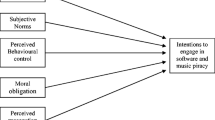Abstract
Software piracy is a major global concern forbusinesses that generate their revenues throughsoftware products. Moral intensity regardingsoftware piracy has been argued to be relatedto the extent of software piracy. Anunderstanding of the development of moralintensity regarding software piracy inindividuals would aid businesses in developingand implementing policies that may help themreduce software piracy. In this research westudied the similarities and differences indevelopment of moral intensity regardingsoftware piracy among university students intwo different cultures, the U.S. and Thailand. In particular, we studied the influence of theimmediate community of individuals, such asother students, faculty, and other universityemployees, on the development of moralintensity regarding software piracy of the twogroups of students. Results indicate that, ingeneral, there are significant differences inmoral intensity regarding software piracybetween students from the US and Thailand, andthat gender differences also exist. Though theeffect of the immediate community on theself-perception of moral intensity regardingsoftware piracy of students was significant,there appears to be very little significantdifferences in this effect between the studentsin the two different countries studied. Thefindings have implications for teachingbusiness ethics, and for developing andimplementing policies to curb global softwarepiracy.
Similar content being viewed by others
References
Anonymous: 1999, Thailand Tries New Approach to Lessen Software Piracy, http://u5.com/art/webnews/thai_piracy/19991003/.
Athey, Susan and John Plotnicki: 1994, 'Would the Software Police Find Your Company Guilty?', Journal of Systems Management (October), 32–38.
Banerjee, D.: 1992, 'Ethical Behavior of IS Personnel: In Search of Behavioral Model', Unpublished Doctoral Dissertation, University of Arkansas, Fayetteville, AR.
Cheng, H. K., R. Sims Ronald and Hildy Teegen: 1997, 'To Purchase or to Pirate Software: An Empirical Study', Journal of Management Information Systems 13(4), 49–60.
Eining, M. M. and A. L. Christensen: 1991, 'A Psycho-Social Model of Software Piracy: The Development and Test of a Model', in Roy Dejoie, George Fowler and David Paradice (eds.), Ethical Issues in IS (Boyd & Fraser Publishing Company).
Leary, Angela: 2002, 'Accolades for Piracy Busters', Asian Business, Honk Kong (March).
Kini, R. B., A. Rominger and B. S. Vijayaraman: 2000, 'An Empirical Study of Software Piracy and Moral Intensity Among University Students', Journal of Computer Information Systems 40(3), 62–72.
Kohlberg, L.: 1969, 'Stage and Sequence: The Cognitive Developmental Approach to Socialization', in D. Growling (ed.), Handbook of Socialization Theory & Research (Rand McNally).
Lane, P. L. and M. R. Lane: 1996, 'Ethical Views and Behavior Regarding Software: Undergraduate Business Students Vs. MBA Students', Proceedings of the Annual Decision Sciences Institute Conference.
Logsdon, J. M., J. K. Thompson and R. A. Reid: 1994, 'Software Piracy: Is It Related to Level of Moral Judgment?', Journal of Business Ethics 13, 849–857.
Pornpitakpan, Chanthika: 2000, 'Trade in Thailand: A Three-Way Cultural Comparison', Business Horizons 43(2), 61–70.
Ramakrishna, H. V., R. B. Kini and B. S. Vijayaraman: 2001, 'Shaping of Moral Intensity Regarding Software Piracy in University Students: Immediate Community Effects', Journal of Computer Information Systems 41(4), 47–51.
Rest, J.: 1986, Moral Development: Advances in Research and Theory (Praeger, New York).
Simpson, P. M., D. Banerjee and C. L. Simpson Jr.: 1994, 'Softlifting: A Model of Motivating Factors', Journal of Business Ethics 13, 431–438.
SoftLok, 'Software Piracy Statistics', http://www.softlok.com/softpira.htm (1997).
Stage, Christina: 1999, 'Negotiating Organizational Communication Cultures in American Subsidiaries Doing Business in Thailand', Management Communication Quarterly 13(2), 245–280.
Author information
Authors and Affiliations
Rights and permissions
About this article
Cite this article
Kini, R.B., Ramakrishna, H. & Vijayaraman, B. Shaping of Moral Intensity Regarding Software Piracy: A Comparison Between Thailand and U.S. Students. Journal of Business Ethics 49, 91–104 (2004). https://doi.org/10.1023/B:BUSI.0000013863.82522.98
Issue Date:
DOI: https://doi.org/10.1023/B:BUSI.0000013863.82522.98




